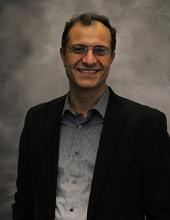DU Research Advances Robotics
Imagine a world where computers can empathize with your mood, tune in to your stress level and react to your social cues to make your workflow easier. It may seem a far-fetched idea. But Mohammad Mahoor, professor of electrical engineering and computer science, believes it can happen. Alongside his team at the University of Denver’s Daniel Felix Ritchie School of Engineering and Computer Science, Mahoor is making breakthroughs in robotics.
Mahoor arrived at the University of Denver in 2008 with hopes of making the world a better place. Since then, he has changed the lives not only of DU community members but also Denver residents.
“It was during my postdoctoral [experience], as I worked alongside the University of Miami psychology department, that truly inspired me to apply my background in engineering to make the lives of those around me easier, even if just a little bit better,” Mahoor says.
His work started with the toylike robots Nao and Zeno, enlisted in efforts to help children with autism spectrum disorder (ASD). Nao and Zeno analyze children’s behavior through facial expression recognition, speech processing and multimodal feedback systems.
“With Nao and Zeno and my research teams’ goal to use robotic technology to interpret behavior and proactively respond, we strive to provide a research base for future treatment of children with ASD,” Mahoor says.
Building on that foundational work, Mahoor added Ryan to his platoon of robots. Ryan is a social companion robot, designed to help both senior citizens suffering from cognitive impairment and the people who care for them.
“The goal with Ryan has been to move technology to the point of humanization that can formulate contextually effective responses based on understanding human mood, emotion and perhaps even human intentions,” Mahoor says.
For Mahoor, the COVID-19 pandemic validated the need for social robotics. With a shortage of caregivers, Ryan filled the gaps.
“We saw that social robots can not only help the elderly but also provide work support to caregivers. Furthermore, we realized that the elderly needed social support due to the isolation from COVID-19 quarantine orders,” Mahoor says.
While these robots make a difference in the community, they also provide unique experiences for students. Students were key in the development and application of Ryan, Mahoor says. In fact, three are listed on the patent for Ryan. With the fourth iteration of Ryan in development, Mahoor hopes to commercialize the robot within the next year or two.
“I am so fortunate to be supported by the DU administration to pursue my niche research,” Mahoor says. “The University of Denver may have various niche research projects occurring on campus; however, our work can positively impact and change the lives of those in our communities and beyond.”



